Glamsquad magazine april-may 2022
- Text
- Expo
- Easter
- Trend
- Feature
- Dubai
- Glamsquad
- Ankara
- Prevention
- Lifestyle
- Arena
- Glamsquad magazine
FEATURE Derrida to know
FEATURE Derrida to know that the binary oppositions that structure the way we see the world — hierarchical dualisms like white/Black, masculine/ feminine, straight/gay, butch/punk — are philosophical machines for reproducing ideology, justifying inequality, perpetuating oppression. Anyone or anything that unsettles their hardline either/or distinctions by straddling them, as biracial, bisexual, and intersex individuals do, or refusing to remain in the category society assigned them to, as transgender and gender nonbinary people do, is a threat to the social order. As it happens, one such threat was in the room that night: Pinkett Smith, the object of Rock’s lame one-liner. ” it “symbolizes hundreds of years of ‘hair politics,’ from the forcible shaving of [African] women’s hair in early European slavery as a form of identity erasure to modern-day beauty norms whereby Black women feel they must [straighten] or bleach their hair to achieve a more European, often known as ‘work-ready’ or ‘professional,’ look.” For that reason, “many Black women,” not just those who’ve lost their hair, “cover their natural hair with wigs,” Why, exactly, do bald women make us so uncomfortable? Is it because we associate the chrome dome with virility? Yul Brynner, Telly Savalas, and Isaac Hayes are synonymous with sex-panther manliness. Is the shorn pate Freudian shorthand for every man’s insatiable, upthrusting little friend? If so, does the masculine femininity of bald women usurp male sexual power, turning them into that Medusan terror, the phallic woman? (The patriarchy likes naked ladies, just not naked up there.) Or is a bald woman, by baring skin seldom seen, hyperfeminized? Is her shocking baldness nudity’s final frontier, a terra erotica of fetishistic possibilities hitherto unknown? Isn’t that what accounts for the erotic frisson of bald women like Pat Evans, the bullwhip-wielding dominatrix on the Ohio Players’ BDSM-lite record covers? (Fascinatingly, Evans shaved her head as a one-woman protest against the white-dominated fashion industry’s hostility to Blackness, specifically Black hair). Open to disparate readings, complementary and contradictory, the image of a bald woman is irreducible to a single, fixed meaning. That’s what makes it so radically disruptive to cornerstone binaries like male/female, masculine/feminine, sexual/sexless. In his 1996 book A Year With Swollen Appendices, Brian Eno muses on what he calls “axis thinking,” which considers cultural phenomena as points on “a continuum of possibilities between two extreme positions: so, the axis between black and white is a scale of greys.” The example he chooses, interestingly, is the haircut, maybe because Eno is bald, which gives him a usefully alienated perspective on the subject. Haircuts are virtually never unequivocally masculine or feminine, he points out; more often than not, they fall “somewhere on the wide range of hybrids” between the two sides of the binary. “In fact,” he argues, “we would feel constrained if we couldn’t make descriptions in these fuzzy, hybrid, terms.” Axis thinking is a monkeywrench in the machinery of hierarchical dualisms. It reminds us that neither end of the continuum is a fixed point; whatever the axis, definitions of both poles change over time and across cultures, local contexts, racial and ethnic groups, and so forth. Thinking in “a scale of greys” rather than black-or-white absolutes “is a transition from polar thinking … to axial thinking,” says Eno. I am interested in these transitions — these moments when a stable duality dissolves into a proliferating and unstable sea of hybrids. … The period of transition is marked by excitement, experimentation — and resistance. Whenever a duality starts to dissolve, those who felt trapped at one end of it suddenly feel enormous freedom — they can now redescribe themselves. But, by the same token, those who defined their identity by their allegiance to one pole of the duality (and rejection of the other) feel exposed. … This can create wide-scale social panic: vigorous affirmations of the essential 20 www.glamsquadmagazine.com
FEATURE rightness of the “old ways,” moral condemnation of the experimentalists, “back to basics” campaigns, all the familiar signs of fundamentalism. He’s writing in 1996, but he might as well have tweeted this from an Oscars after-party. Stable dualities dissolving? “A proliferating and unstable sea of hybrids”? That’s where we live. By choosing to respond with violence — the first refuge of the witless — Smith missed a rare opportunity. The Academy Awards isn’t Plato’s symposium, but Rock’s winceworthy groaner could’ve inspired a truly edgy exchange, not on par with the Socratic dialogues, probably, but one almost certain to make the assembled celebs and the rest of us out in TV Land reconsider, between fistfuls of Jiffy Pop, our definitions of femininity and masculinity. In my dreams, it’s Pinkett Smith, not her husband, who rises to the challenge. Leaping onstage and seizing the mic, she uses Rock’s mockery of her condition to make us confront the question of why, exactly, bald women are such a menace to society. She calls out a repressive femininity long past its sell-by date, flags the obsolescence of “ain’t no punk” masculinity and Monty Pythonian notions of chivalry that compel a man to make a pluperfect ass of himself defending “his” woman’s “honor.” She reflects on the role anxious white masculinity played in electing Trump and in populating the ranks of the tiki-torch Nazis at Charlottesville, the Proud Boys, and other aspiring Alpha bro’s well-represented at the insurrection. She offers a masterclass in the art of the dunk, riffing on Trump’s comb-over as a cockscomb with erectile dysfunction, the hood ornament of a white-supremacist patriarchy running on the fumes of malignant narcissism and boundless self-delusion. She compares and contrasts it with the radical exuberance of African-American hairstyles, especially Black women’s embrace of the African tradition of coiffure as sculpture, which they’ve taken to dizzy heights of tonsorial virtuosity. Referencing Eno’s mention of the ancient-to-futuristic axis as one of many ways to think about haircuts, she spins an oppositional myth that jettisons the reactionary trope of bald women as epicene, droidlike drones (as in George Lucas’s THX 1138), invoking the fierce, regal Dora Milaje, Black Panther’s warrior women, as Afrofuturist heralds of things to come. She cites the moment in the movie when General Okoye (Danai Gurira), head of the Dora Milaje, yanks off her wig (“this ridiculous thing”) and flings it to the ground, an act of “resistance” born of the “enormous freedom” to “redescribe” herself that liberated bald Black women all over America to toss their wigs in the dustbin of history. Okoye’s act is powerfully liberatory, writes Zara van Twest in “‘Screw this’: Hair Politics and Female Empowerment in Black Panther,” because it “symbolizes hundreds of years of ‘hair politics,’ from the forcible shaving of [African] women’s hair in early European slavery as a form of identity erasure to modernday beauty norms whereby Black women feel they must [straighten] or bleach their hair to achieve a more European, often known as ‘workready’ or ‘professional,’ look.” For that reason, “many Black women,” not just those who’ve lost their hair, “cover their natural hair with wigs,” notes van Twest. (Irony of ironies, Chris Rock knows this better than most: his 2009 documentary Good Hair teases out the painful truths of African-American women’s obsession with perfect — read: white — hair.) Van Twest includes a photo posted by Black Panther co-star Lupita Nyong’o (who played a Dora Milaje named Nakia) with Gurira, captioned, “Danai is my comrade, my co-star, my collaborator, my dear friend, my soul sister and patriarch resistor. Let us throw off our proverbial wigs and bask in her glow!” Defying chronology, Pinkett Smith doesn’t miss the chance to preemptively drag the odious anti-woke troll Bill Maher for admonishing her, in a Real Time monologue, to “just put on a fucking wig like everybody else at the Oscars if it bothers you so much.” Spoken without hesitation, equivocation, or apology, Pinkett Smith’s guerrilla monologue would be a slap in the face of a dying fundamentalism. But it wouldn’t be any more than bald truth. Credit: Mark Dery, via GEN www.glamsquadmagazine.com 21
- Page 1 and 2: Glamsquad april/may 2022 March: tHE
- Page 3 and 4: 10 20 Ankara Style Inspirations to
- Page 5 and 6: Powerful Fashion Statements With th
- Page 7 and 8: Happy Easter Candle Easter is often
- Page 9 and 10: LIFESTYLE Grow your own This remain
- Page 11 and 12: 20 FASHION Ankara Style Inspiration
- Page 13 and 14: FASHION www.glamsquadmagazine.com 1
- Page 15 and 16: Will Smith & Chris Rock of Nigerian
- Page 17 and 18: FEATURE enough, do not worry. Darin
- Page 19: FEATURE Let’s unpack the cultural
- Page 23 and 24: FEATURE Deborah Anne Dyer OBE, know
- Page 25 and 26: BEAUTY Using Tape or Spoon for Cat
- Page 27 and 28: LIFESTYLE Make Your Lipstick Last L
- Page 29 and 30: of which became the first Nigerian
- Page 31 and 32: GREECE How about throwing out your
- Page 33 and 34: ESCAPE What Is a World Expo? A Worl
- Page 35 and 36: ESCAPE More affordable housing proj
- Page 37 and 38: FOOD skillet so that the rice doesn
- Page 39 and 40: HEALTH Warm water with lemon in the
- Page 41 and 42: FEATURE By Glory Uyi What Are Some
Inappropriate
Loading...
Mail this publication
Loading...
Embed
Loading...
About us
Contributing to conversations on contemporary fashion, dining, beauty, wellness, music, and movies; our goal is to positively shape the conversation on these topics in a way that Informs, inspires, empowers, and ultimately entertains Nigerian and African women.
Glamsquad magazine is for the sophisticated, tasteful, yet fun-loving woman.
Let’s hold you by your hands into the world of fashion. Like and follow us on any of our social media platforms.

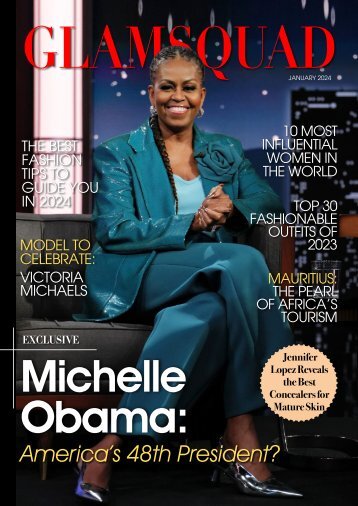
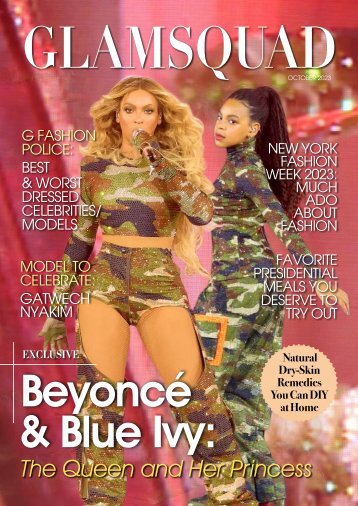




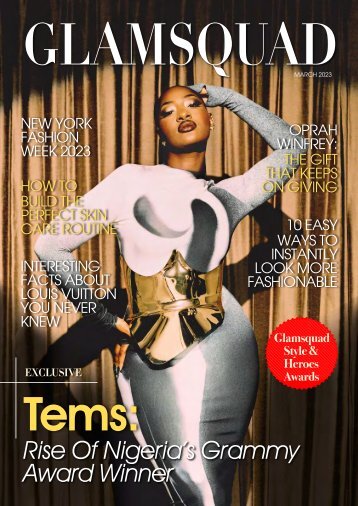
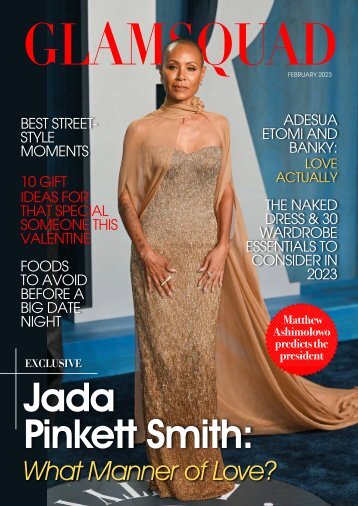
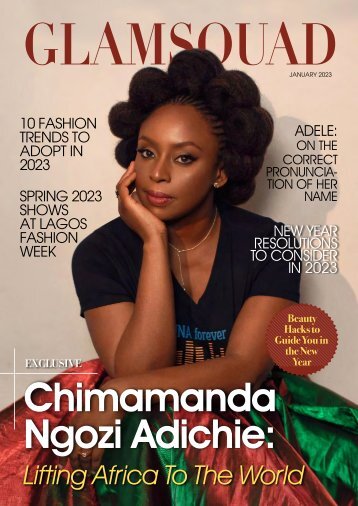

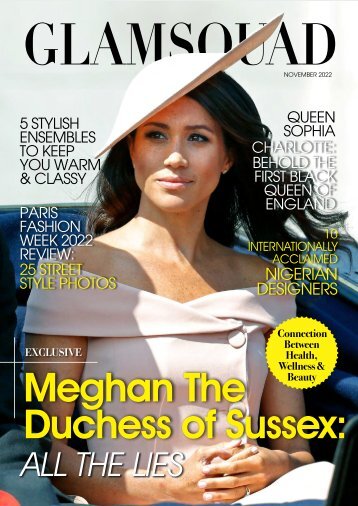


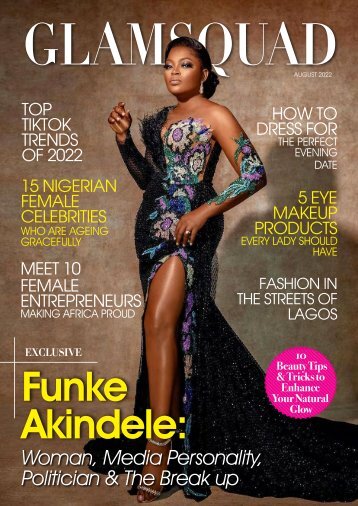
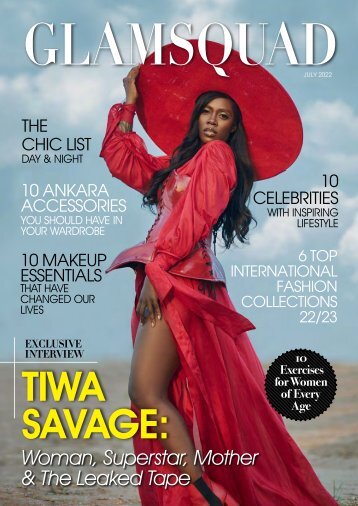


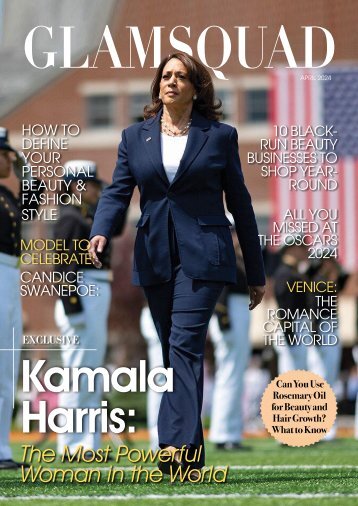



















Connect With Us